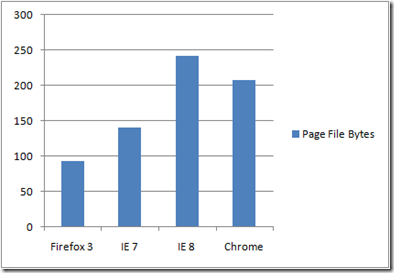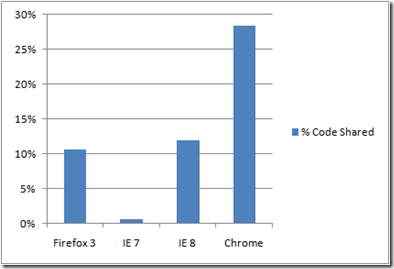After posting our controversial findings about memory usage under IE 8 and Chrome (see previous post here and here), we received feedback from some our our readers criticizing our use of the Process\Working Set counter values to size the various browser processes. The complaint was that this counter does not factor code (OCX, DLLs, et al) shared across the various process instances.
Fortunately, the DMS Clarity Tracker agent also collects the Page File Bytes counter for each process (i.e. the “Private Bytes” counter as represented in Task Manager), which is a more accurate measure of the RAM footprint (as backed by reserved page file space) of each process instance. And indeed, PF Bytes paints a slightly different picture than Working Set.

Figure 1 – Page File (i.e. Private) Bytes under Windows XP
For starters, IE 8’s average memory consumption under Windows XP, as tallied across all process instances, drops from 271MB to 242MB when viewed through PF Bytes. Likewise, Chrome’s total process working set (i.e. all 12 instances) drops from 267MB to 208MB, while Firefox’s single process footprint goes from 104MB to 94MB. Interesting, IE 7’s Working Set and PF Bytes values are almost identical – it appears to be sharing nothing with any other process.

Figure 2- % Shared Code Across All Browser Instances
In a way, we’re glad that we received the aforementioned critical feedback because it forced us to take a look at the level of code re-use present in each competing browser. And here is where Google’s clean design reaps real dividends: By comparing the total Working Set and PF Bytes values, we can conclude that Chrome is sharing roughly 28% of its code image across its various instances. Compare this to IE 8 (12%) and Firefox (11%), and you begin to see why its sometimes better to start with a clean slate.
Bottom Line: IE 8 is still “fat” by any measure, while Google Chrome’s “chubbiness” is offset somewhat by its more efficient use of shared code across process instances.



2 comments:
There are quite a few people who are afraid of the memory utilisation induced by the (nice) design of Chrome, I wonder if it wouldn't be intesesting to compare Safari and Chrome memory utilisation.
Of course the Javascript engine and the 'shell window' are different also so this won't only measure the difference caused by the design, but this could be interesting..
renox, well I am just afraid as well, although there is no need for it.
Regarding the benchmarks, I´d say that we just have to wait for the alpha versions of chrome and IE8, since chrome doesn´t even assist google toolbar, yet:D ^^ LOL that´s funny.
Post a Comment